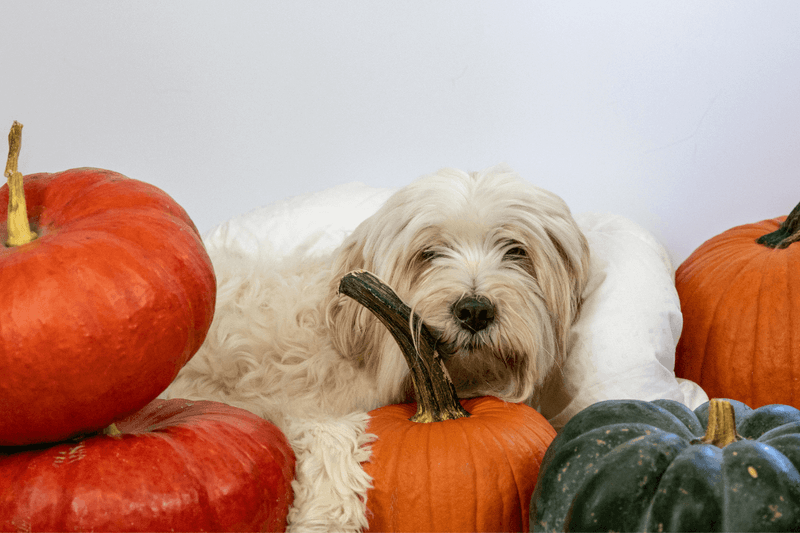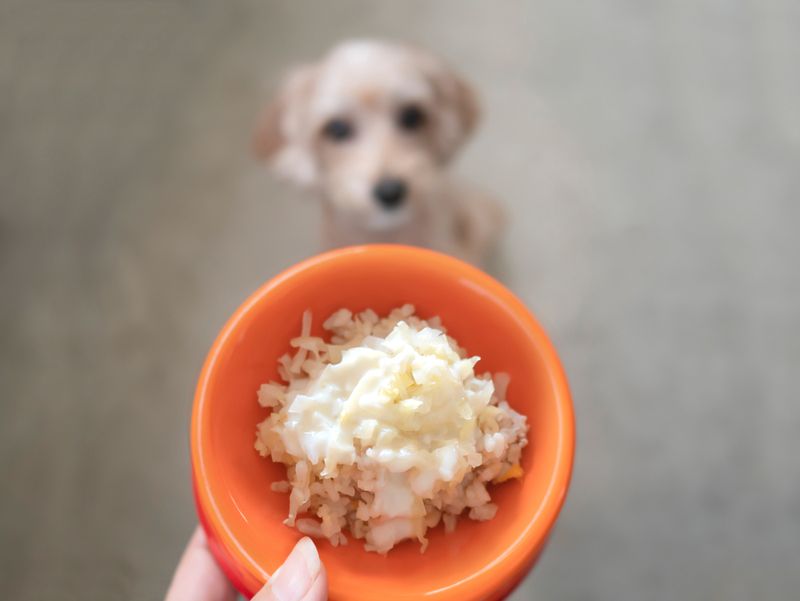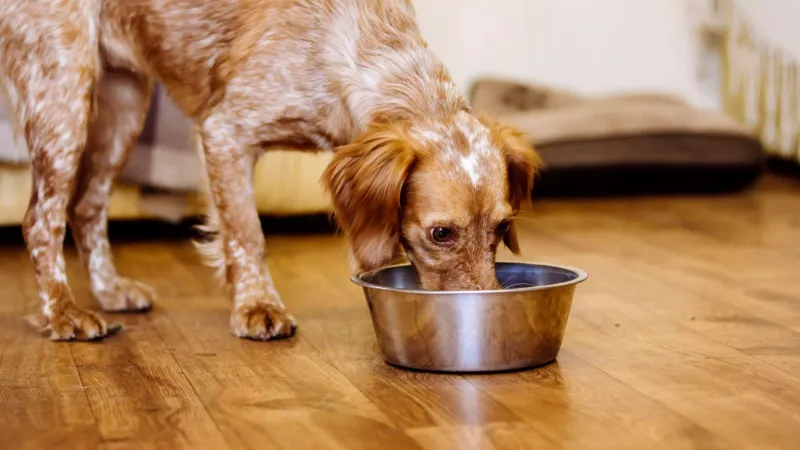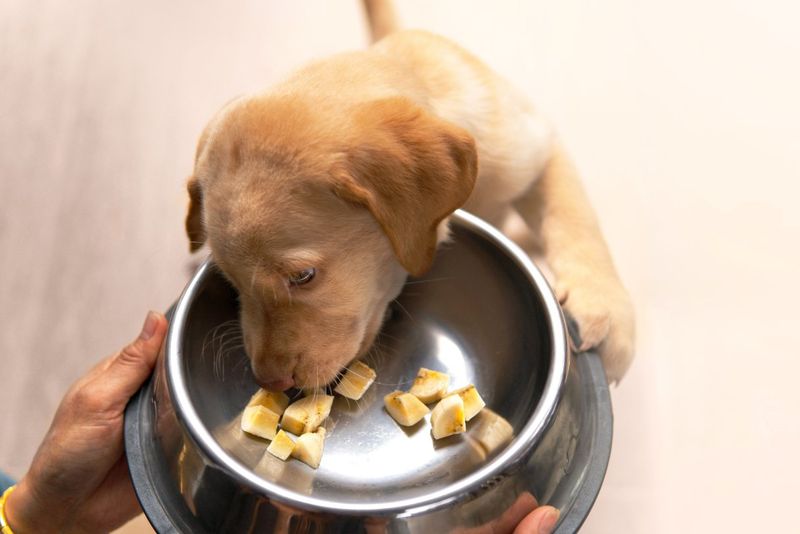14 Simple Remedies For Your Dog’s Upset Stomach

Imagine this: Your furry friend looks up at you with those big, soulful eyes, but something seems off. A dog’s upset stomach can turn your world upside down, but don’t worry – rescue is closer than you think!
Here are paw-some remedies to help ease your pup’s tummy troubles and bring back those wagging tails.
1. Pumpkin Purée

Pumpkins aren’t just for Halloween carvings; they make fantastic doggy tummy soothers. With its rich fiber content, pumpkin helps regulate digestion and ease constipation or diarrhea.
Add a spoonful to your dog’s meal, and watch them gobble it up like a treat! It’s a simple remedy that packs a punch.
Even fussy eaters find it irresistible. You may just find yourself amazed at the quick turnaround in your pup’s demeanor.
2. Plain Cooked Rice

Rice seems plain, right? But this humble grain is a belly’s best friend when it comes to canine indigestion.
Cooked until soft and mixed with a bit of chicken broth, rice becomes a comforting meal that’s gentle on your dog’s stomach.
It’s like giving your pup a warm hug from the inside. Just remember to keep it unseasoned to avoid any further upset.
3. Boiled Chicken

Boiled chicken is the superhero of bland diets for dogs. Its lean protein is gentle on the stomach and easy to digest. Serve it plain and shredded, and watch your pup’s eyes light up.
It’s not just food; it’s comfort on a plate. Plus, it mixes well with rice for a wholesome meal. This simple dish can turn a droopy dog into a playful furball in no time.
4. Bone Broth

Bone broth isn’t just for human health enthusiasts; it’s a miracle worker for ailing pups too! Rich in nutrients, it helps hydrate and soothe a dog’s upset stomach.
A warm cupful can make a world of difference, easing discomfort and restoring energy. It’s like a magical elixir that turns a whimper into a wag. Just make sure it’s free from onions and spices before serving.
5. Ginger Infusion

Ginger isn’t just for cookies! This spicy root is a natural anti-nausea remedy for dogs. A small infusion of ginger tea can calm a stormy stomach and prevent vomiting.
It’s like a tranquilizer for tummy troubles but without the chemicals. Your pooch might not even know they’re having medicine; it’s that subtle. Just a teaspoon can make a noticeable difference.
6. Probiotic Yogurt

Yogurt, especially the probiotic kind, is a treat with benefits. Packed with healthy bacteria, it supports your dog’s digestive system, balancing the gut flora.
It’s a tasty way to help your pooch with diarrhea or indigestion. Plus, most dogs love the creamy texture. You’ll enjoy watching them happily lap it up, knowing it’s helping them feel better.
7. Fennel Seeds

Fennel seeds might seem exotic, but they’re a flatulence-fighting superhero for dogs. Crush a small amount and sprinkle it over your dog’s food to ease gas and bloating.
It’s like giving them a magic potion that settles the storm within. This aromatic herb makes meals exciting and soothing at the same time. Your pup will thank you with a relieved sigh!
8. Slippery Elm

Slippery elm is a bit of a secret weapon when it comes to soothing canine stomach upsets. Its mucilage content coats the stomach lining, offering instant relief.
Mix it with water to create a syrupy consistency, and give it to your furry friend. It’s like a gentle pat on the back for their tummy troubles. Your dog will appreciate the comfort it brings.
9. Rice Water

Rice water might not sound exciting, but it’s a hidden gem for calming a queasy doggie stomach. The starchy water left after boiling rice acts as a soothing agent.
It’s like a gentle lullaby for their tummy. Serve it in small amounts, and watch as it brings comfort and relief. Sometimes, the simplest solutions are the most effective.
10. Apple Cider Vinegar

A tiny splash of apple cider vinegar in your dog’s water bowl can work wonders. It balances the pH in their stomach and aids digestion, turning a sour mood sweet.
Not only does it help with tummy troubles, but it also boosts their immune system. It’s like an all-in-one remedy that’s easy to add to their daily routine. Just be sure to use it sparingly!
11. Peppermint Tea

Peppermint isn’t just for freshening breath; it’s a go-to remedy for canine nausea and stomach cramps. A bit of cooled peppermint tea can calm those canine jitters and help them rest easy.
It’s like a refreshing breeze on a summer day for their digestive system. Offered in moderation, it’s a soothing sip that can make a big difference.
12. Mashed Sweet Potato

Sweet potatoes are more than just a delicious treat—they’re a fiber-rich aid for your dog’s digestion. Mashed and plain, they’re gentle on the stomach and full of nutrients.
It’s like a sweet, comforting hug in a bowl. Dogs love the natural sweetness, and you’ll love how it helps them feel better. Just make sure it’s cooked thoroughly and free from additives.
13. Chamomile Tea

Chamomile tea isn’t just for humans winding down after a long day. This herbal brew helps reduce inflammation and calm an upset stomach in dogs.
It’s like a warm hug in a cup, bringing peace to their digestive system. Serve it cool and unsweetened for best results. Your pooch will appreciate the tranquility it brings to their tummy troubles.
14. Banana Slices

Bananas are a top pick for a quick digestive fix. Their natural sugars and fiber help firm up stool and ease digestion. Plus, they’re a sweet treat most dogs adore.
Think of it as a tropical vacation for their tummy! Just slice it up, offer it as a snack, and watch your dog enjoy the fruity goodness. It’s a simple and tasty way to aid digestion.






